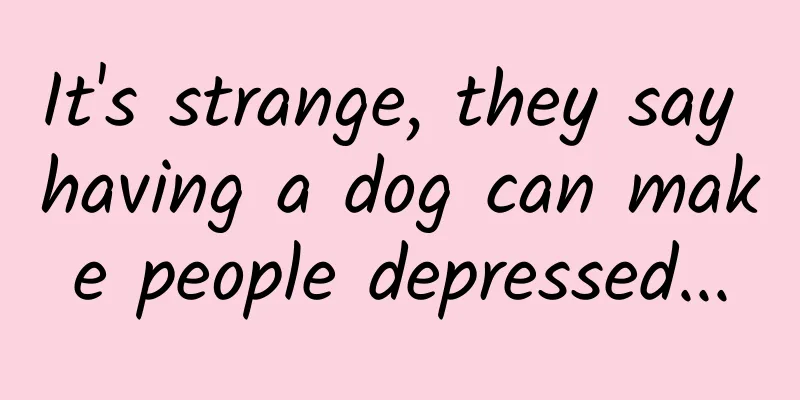It's strange, they say having a dog can make people depressed...

|
Dogs are humans’ best friends and companions , and they have strong emotional bonds with humans. Today, after tens of thousands of years of domestication, dogs have come to play multiple roles in human society, such as accompanying family members, guarding homes, helping the disabled, hunting, herding, carrying cargo, pulling carts, and being used in police and military affairs. Due to their cute appearance and understanding high emotional intelligence, dogs are believed to bring happiness to humans and improve their sense of well-being . (Source: Pixabay) However, scientists from the University of Liverpool in the UK and Purdue University in the US have now put forward a different view, arguing that dogs may also make their owners more anxious and depressed . The related research paper, titled "Dogs and the Good Life: A Cross-Sectional Study of the Association Between the Dog–Owner Relationship and Owner Mental Wellbeing", has been published in the scientific journal Frontiers in Psychology. (Source: Frontiers in Psychology) Carri Westgarth, a senior lecturer in human-animal interaction at the University of Liverpool and the corresponding author of the paper, explained: “The public and media have a perception that dogs are great for our mental health and as someone who has owned multiple dogs, I believe they have brought joy to my life but also added stress and anxiety , and I know the reality is much more complex. I have also spent a lot of time helping owners of dogs with behavioural issues who clearly find having a dog very challenging.” In this study, the sample was data from 1,693 dog owners recruited from the UK. Participants were recruited online through social media and were asked to complete a questionnaire including open-ended and closed-ended questions about their dogs, their relationship with their dogs, their physical and mental health, etc. Among them, the open-ended questions included the reasons for owning a dog and how they thought owning a dog affected their mental health. Westgarth et al. found that while dog owners who had a more intimate relationship with their dogs tended to experience positive effects, including greater emotional support and a sense of companionship, there were also some negative outcomes, such as greater depression and higher levels of anxiety. “While many people say having a dog helps them manage some mental health symptoms, such as providing a distraction from negative thoughts, the responsibility of caring for a dog can become a burden and be overwhelming, preventing them from socialising with others as they once did.” These two distinct responses can be seen in the participants’ responses to the open-ended questions. On the one hand, participants gave positive responses that promoted self-acceptance, provided goals, and reduced emotional pain. "Makes me happy." “(My dog) gives me a reason to get up in the morning.” “Someone to hug when I’m feeling down.” "No matter what happens, they will never judge you." “She instinctively knew when I was upset and would come and sit next to me.” "When you have a dog, there are always fun things happening, always! What's not to like?" “I can talk to them and share my thoughts with them, which helps my mental health.” “My dog taught me how to have fun again, taught me to be present in the moment, made me laugh, really laugh.” “You have to walk your dog twice a day, it makes you feel better, you get to meet new people and the dog owners are almost always lovely.” "It's a good feeling to be needed. This little life depends on me for most things. Taking care of it means I can take better care of myself." Figure | The positive and negative effects of dog ownership on dog owners' happiness, as derived from participants' responses to open-ended questions. (Source: The paper) On the other hand, there were participants who felt that meeting the dog’s needs was a burden. “I’m most worried about them getting sick or injured.” “When it barks in the middle of the night, I get scared or worried.” “If they make a mess, it’s frustrating.” “I always make sure (my dog) is satisfied physically and mentally.” “Need to walk every day (even if I’m exhausted or in pain).” “It feels like a failure in trying to always give them the attention they need.” “They have to be put first, and sometimes I have to miss things to make sure they’re taken care of.” “When I’m too anxious to go out and walk my dog, I feel guilty and useless for not being able to do the right thing for my dog.” "It shreds paper and plastic and makes such a mess that I can't leave anything important alone. If it could get away with that it would have more access to the house and I'd enjoy it more. It's a bit tiring!" "It builds up worry, anxiety and guilt. Am I training him correctly? Is he okay when he's alone? Am I giving him the best food? I feel guilty when he's not moving enough because (I'm) feeling down." "While having a dog can provide benefits such as increased exercise, fun and companionship, it also presents some challenges. For those who suffer from depression and anxiety, it can make conditions worse in some cases ," Westgarth said. (Source: Pixabay) However, Westgarth et al. also acknowledge that their work has certain limitations . For example, they are currently unable to determine the causal relationship between dog ownership and increased anxiety and depression . In fact, people with higher levels of anxiety and depression may be more likely to adopt dogs. At the same time, the sample data of this study mainly came from women and may not represent the universality. But in any case, dogs can indeed increase the happiness of their owners and play an important role in life that cannot be ignored. How to better handle the relationship with dogs may be an issue that every dog owner needs to think about seriously. What do you think about this research? Welcome to leave a message in the comment area to share~ References: https://www.frontiersin.org/articles/10.3389/fpsyg.2022.903647/full https://www.psypost.org/2022/09/new-study-sheds-light-on-the-positive-and-negative-impacts-of-dog-ownership-on-psychological-wellbeing-63908 Academic headlines |
<<: The "purple" in front of you is not purple? What kind of purple are you talking about?
>>: Popular Science Illustration | Space plants are growing in the Wentian laboratory cabin!
Recommend
91 Ten Articles: WeRide's valuation exceeds 20 billion, SAIC will launch a battery bank, and Huolala may build cars
1. WeRide raised hundreds of millions of dollars ...
Interesting hardware at the TC Conference: the coolest helmet and frying pan
The TechCrunch Disrupt conference has entered its...
Didi Chuxing is banned: The dilemma of the government not doing social innovation
Not long after Didi Chuxing was launched in Augus...
6 tips to teach you how to master creative marketing during the Mid-Autumn Festival!
Recently, I looked up at the bright moon and thou...
Summary of bidding data analysis: How to analyze bidding data?
Summary of bidding data analysis: How to analyze ...
Advertising plan planning and proposal skills and methodology!
A certain educational client is a well-known onli...
[Jingang Talks Finance] Jingang | Band 42 Chapter "Gold" (Upper, Middle, Lower)
[Jingang Talks Finance] Jingang | Band 42 Chapter...
Xiaomi may lead the privatization or even direct acquisition of Xunlei
On June 30, Forbes website published an article s...
How to use Xiaohongshu to create a hot-selling online celebrity product
To make it easier to understand this article, let...
After checking out more than 30 types of vinegar in the supermarket, the most recommended one is... You won’t waste your money after reading this!
In the fast-paced life, people often pursue simpl...
Audi poaches Volvo to fill vacant technical development director position
(Peter Mertens shows the S90) According to Reuter...
A woman pulled a "string" along the way after eating mushrooms. She said that if you eat mushrooms, you will eat the soul of the mushrooms. You can't eat mushrooms randomly!
Recently, we often see news about people who have...
Don't take it lightly! These 11 inconspicuous "little habits" may send you to the hospital...
Reviewer of this article: Wang Wenxiang, Professo...
These data are quite "hardcore"!
On March 8, the second "Minister's Chann...
Tsinghua University teacher Pan Pan's learning motivation
Tsinghua University teacher Pan Pan's introdu...









